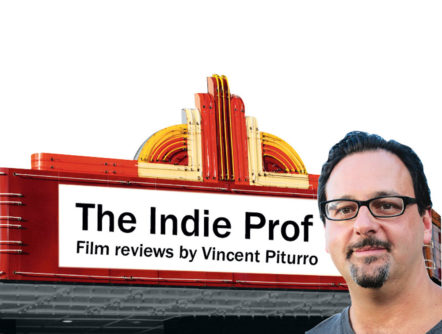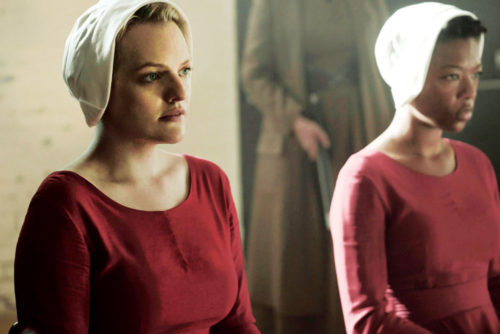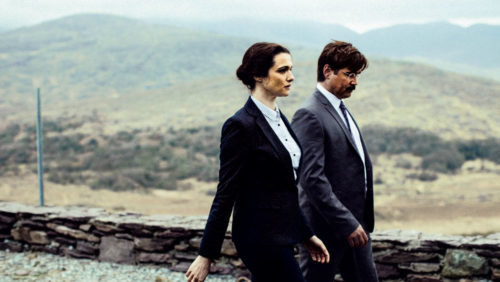
Each month, the Indie Prof reviews a current film in the theater and second film or series available on DVD or instant-streaming service. Follow “Indie Prof” on Facebook for updates about film events and more reviews.
July is Science Fiction month, and it marks the start of the seventh annual Science Fiction Film Series. I host the series, in conjunction with the Denver Museum of Nature & Science and the Denver Film Society. The goal is to join art and science, explore the intersections therein, separate fact from fiction, and to discuss the relevance of Science Fiction in contemporary society. Science Fiction is not all about aliens and outer space—much of the best recent Sci-Fi is set in the near future and tells us more about the current world rather than the future world. This month’s column looks at two different iterations of near-Sci-Fi, one a new series on TV and one a film featured in the series. Find more information about the series on the DMNS website or the Film Society website.
The Handmaid’s Tale (Hulu)
This is the best show on TV.

The Handmaid’s Tale
The adaptation of Margaret Atwood’s wonderful 1980s novel of the same name stays true to the book but it also breathes contemporaneous life into it, creating a fully realized world that is chilling, eerie, and oppressive. The book and show tell the story of a near-future patriarchal oligarchy called Gilead (a part of the former United States) in which the women become property of the state amidst a backdrop of environmental disaster, increasing sterility, and religious fundamentalism. The young, fertile women become handmaids whose sole purpose is to bear the children of the powerful men. The story centers around one handmaid, Offred (literally “Of Fred,” owing to her status as the handmaid of Fred) and her life in the Commander’s house. There is no need to explain the prevailing allegory at work here.
The production values, acting, cinematography, editing, and sound rival the best of any cinematic venture. At times the camera is static and the frame is composed in a deep-focus that allows life to pass as we witness it realistically. The effect is chilling. Other times, the camera takes on a dynamic feel that lends itself to the subject perfectly. Where and when these styles are used is quite masterful, and the overall aesthetic reminds of the great directors who blend the realism of Italian Neorealism with the stylized camera and editing of the French New Wave. The compositions are so careful that stopping the frame may render it a Van Eyck painting. It is painting on the screen.
The writing and filming certainly shine, but the acting is equally brilliant. Elizabeth Moss will have busy award seasons ahead of her as the lead and the intense heart, soul, and compass of the series. She plays the careful Offred of Gilead as perfectly as she plays June, her real name in the pre-Gilead world. The rest of the cast is strong; Yvonne Strahovski as Serena Joy, the Commander’s wife, is particularly venal and effective. Her character may be the most relevant to the current state of politics: is being complicit to the events around her just as bad, or worse, than the events themselves?
Season one is available on Hulu.
You will enjoy this series if you liked Children of Men, Westworld, and/or 1984.
The Lobster (2015)
What a strange, interesting, and provocative movie.

The Lobster
This latest film from Greek director Yorgos Lanthimos is an absurdist satire that is funny, piercing, and profoundly disturbing. The best satire—whether it be from writer Jonathan Swift or the great director Luis Buñuel—is most effective when it comments directly on the contemporary society. The Lobster falls into that category.
The story is set in a near-future dystopia where being single is outlawed. The uncoupled are rounded up in “The City” and brought to “The Hotel.” If they are unable to find a suitable mate in 45 days, they will be turned into an animal of their choice. The protagonist David (Colin Farrell), a recently divorced, paunchy, and emotionless soul, is sent to The Hotel after his divorce. He becomes our Virgil into this inferno. He chooses to be a lobster should he fail.
The Hotel is a house of horrors: they have regular group meetings where they are told of the perils of being single (women will get attacked, raped, etc.); they are sexually enticed but they must abstain; they are publicly shamed after infractions; they hunt a band of escaped rebels in the nearby woods; and they remain under constant surveillance and a ticking clock. David eventually tries to fake a relationship (a crime penalized by early transformation into your chosen animal) and when that union goes sour, he flees into the woods to join the rebels. But even the rebels have their own rules: everyone must remain single, and relationships are a death sentence. Soon after, David falls in love with a rebel (Rachel Wiesz).
The societal comments are fascinating—the obvious point is how our own society places a premium on couples and disenfranchises singles. But it goes much further: the film also speaks to our collective apathy, how we are so easily led, and even how our society chooses to publicize everything. A secondary concern is how advertising and its redundancy turn us into sheep. Or dogs. Or camels. Or flamingos. Or even a lobster.
Screening 7pm Wed., July 17 at the Denver Museum of Nature & Science. Also available at various on-demand outlets.
You will enjoy this film if you liked Her, Brazil, and/or Birdman.
Vincent Piturro, Ph.D., is an associate professor of Cinema Studies at Metropolitan State University of Denver. He can be reached at vpiturro@msudenver.com.



0 Comments